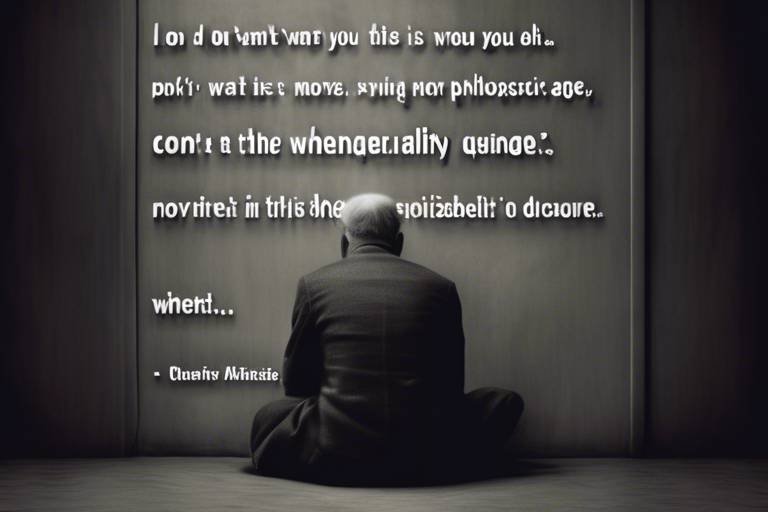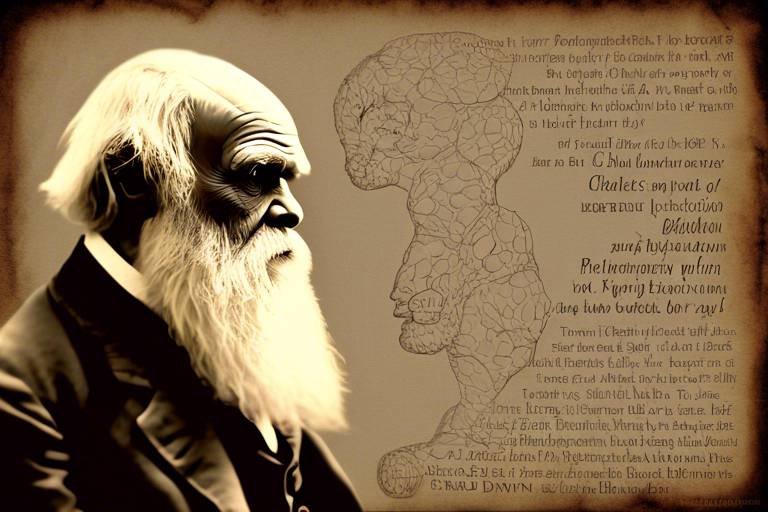Rationalism Vs Empiricism - Which Stands Stronger?
The debate between rationalism and empiricism has stirred intellectual waters for centuries, creating waves of thought that continue to influence our understanding of knowledge and reality. At its core, this philosophical clash raises a fundamental question: how do we truly know what we know? Is it through the innate ideas and reasoning that rationalists champion, or through the tangible experiences and observations that empiricists advocate? This article dives deep into the heart of these two schools of thought, exploring their definitions, historical contexts, and key figures, while also weighing their strengths and weaknesses in the quest for knowledge.
Rationalism posits that reason and innate knowledge are the bedrock of understanding. Imagine trying to build a house; rationalists believe that the blueprint—crafted by reason—is essential before laying the first brick of experience. On the other hand, empiricism insists that knowledge is primarily derived from sensory experiences. Picture a scientist in a lab, meticulously observing and experimenting to discover the laws of nature; this is the empiricist's approach to knowledge acquisition. Both perspectives offer unique insights, yet they also present challenges that invite scrutiny.
As we navigate through this philosophical landscape, we will encounter significant figures like René Descartes and John Locke, whose contributions have shaped the discourse around rationalism and empiricism. Descartes famously declared, "I think, therefore I am," emphasizing the role of doubt and reason in establishing knowledge. In contrast, Locke argued that the mind is a blank slate at birth, and knowledge is imprinted through experience. These contrasting views highlight the rich tapestry of thought that characterizes this debate.
Moreover, understanding the historical context is vital. Rationalism emerged during the Enlightenment, a time when reason was celebrated as the path to knowledge. Conversely, empiricism gained traction during the Scientific Revolution, when observation and experimentation began to dominate intellectual inquiry. This historical backdrop not only informs our understanding of these philosophies but also illustrates their evolution over time.
In the sections that follow, we will delve deeper into each philosophy, examining their foundational principles, critiques, and the implications they hold for our understanding of knowledge. By comparing their strengths and weaknesses, we aim to uncover which approach stands stronger in the quest for truth. So, grab your thinking cap and join us on this philosophical journey!
- What is the main difference between rationalism and empiricism?
Rationalism emphasizes reason and innate knowledge as the primary sources of understanding, while empiricism asserts that knowledge comes primarily from sensory experience.
- Who are the key figures associated with rationalism?
Notable rationalists include René Descartes and Baruch Spinoza, who contributed significantly to the development of rationalist thought.
- What critiques exist against empiricism?
Critics argue that empiricism may overlook the reliability of sensory experiences and struggles with abstract concepts that cannot be directly observed.
- Can rationalism and empiricism coexist?
Many philosophers believe that a synthesis of both approaches can provide a more comprehensive understanding of knowledge, acknowledging the roles of both reason and experience.

Defining Rationalism
Rationalism is a philosophical doctrine that posits that reason and innate knowledge are the primary sources of understanding the world around us. Unlike empiricism, which relies heavily on sensory experience, rationalism suggests that the mind has the ability to grasp certain truths independent of external input. This notion can be likened to the idea of a mathematical truth—for instance, the understanding that 2 + 2 4 doesn’t require physical objects to validate it; it is inherently known through reason.
At its core, rationalism champions the belief that certain concepts and principles are hardwired into our minds. This perspective leads to the conclusion that knowledge can be attained through intellectual deduction rather than through observation alone. For example, think about how we can comprehend complex ideas like justice or beauty without needing to see them in a tangible form. This is where rationalists argue that our minds play a crucial role in shaping our understanding of reality.
Key figures in rationalism, such as René Descartes and Baruch Spinoza, have made significant contributions to this philosophical framework. Descartes famously declared, “I think, therefore I am,” highlighting the importance of self-awareness and reasoning as foundational to knowledge. In contrast, Spinoza emphasized a more systematic approach to understanding reality through a geometric method, suggesting that everything can be deduced logically from fundamental truths.
In the realm of rationalism, there are several key tenets that stand out:
- Innate Ideas: Rationalists believe that certain ideas exist within us from birth, waiting to be discovered through reasoning.
- Deductive Reasoning: This method involves drawing specific conclusions from general principles, emphasizing logic over sensory experience.
- Universal Truths: Rationalists argue that some truths are universally applicable, transcending cultural and individual differences.
While rationalism offers a robust framework for understanding knowledge, it also faces challenges. Critics argue that it may overlook the richness of human experience, which often requires empirical validation. For instance, can we truly understand the concept of love or happiness without experiencing it? This ongoing debate between rationalism and empiricism forms the crux of philosophical inquiry and continues to influence modern thought.

Defining Empiricism
Empiricism is a philosophical doctrine that posits that knowledge primarily comes from sensory experience. In simpler terms, it emphasizes that what we know is rooted in what we can observe, touch, taste, hear, and see. This approach stands in stark contrast to rationalism, which insists that reason and innate ideas hold precedence in understanding the world. Think of empiricism as the ultimate detective, piecing together clues from the world around us, while rationalism is more like a mathematician, relying on abstract concepts and logical deductions.
At the heart of empiricism lies the belief that the human mind starts as a blank slate (tabula rasa), and through experiences, we fill this slate with knowledge. This idea was famously championed by John Locke, who argued that all our understanding originates from our interactions with the environment. He believed that our senses serve as the primary tools for gathering information. This perspective invites us to consider: if our senses can deceive us, can we truly trust our knowledge derived from them?
Empiricists assert that knowledge is not just a collection of abstract ideas but is instead built upon concrete experiences. This philosophy has profound implications for the scientific method, which relies heavily on observation and experimentation. In fact, many empirical thinkers advocate for a hands-on approach to learning, where hypotheses are tested and validated through real-world application. For instance, when a scientist conducts an experiment to test a theory, they are embodying the empirical spirit by seeking to gather data through observation.
Key figures in the development of empiricism include John Locke and David Hume, who made significant contributions to its principles. Locke emphasized the importance of experience in shaping our understanding, while Hume took it a step further by questioning the very nature of causation and whether we can truly know anything beyond our immediate experiences. Their discussions highlight a critical point: while our senses are powerful tools, they are also limited, often leading to questions about the reliability of the knowledge we acquire.
Ultimately, empiricism champions the idea that knowledge is a dynamic process, evolving as we encounter new experiences. This perspective encourages us to remain open-minded and curious, continually seeking to expand our understanding of the world through observation and experimentation. However, it also brings forth challenges, particularly regarding the nature of abstract concepts and the limits of sensory experience. As we delve deeper into the world of empiricism, we must ask ourselves: can we ever truly know anything beyond what we can observe?

Historical Context of Rationalism
The roots of rationalism stretch deep into the soil of philosophical thought, particularly flourishing during the Enlightenment period in Europe, which spanned from the late 17th century to the 18th century. This era was characterized by a profound shift towards reason and scientific inquiry, challenging the long-standing dominance of religious and superstitious explanations of the world. Think of it as a great awakening, where the human mind began to emerge from the shadows of ignorance, seeking clarity through logic and rational thought.
At the heart of rationalism lies the belief that our ability to reason is the primary source of knowledge, rather than relying solely on sensory experience. This perspective was a revolutionary stance against the prevailing views of the time, which often prioritized empirical observation. The rationalist philosophers argued that certain truths are innate and that through the power of reason, we can unlock these truths without needing to depend entirely on what we observe through our senses.
Prominent figures like René Descartes and Baruch Spinoza played pivotal roles in shaping rationalist thought. Descartes, often hailed as the father of modern philosophy, famously proclaimed, “I think, therefore I am,” emphasizing the certainty of self-awareness as a foundation for knowledge. His method of doubt encouraged individuals to question everything they believed, leading to the discovery of undeniable truths through reason alone. In contrast, Spinoza expanded upon Descartes' ideas, proposing a more holistic view of reality, where everything is interconnected through a single substance, which he identified as God or Nature.
During this transformative period, rationalism also faced its share of challenges and critiques. The rise of empiricism, with thinkers like John Locke and David Hume, posed significant questions about the validity of innate ideas and the reliability of reason without empirical evidence. This intellectual tug-of-war between rationalists and empiricists set the stage for a rich philosophical discourse that continues to influence contemporary thought.
To further appreciate the historical context of rationalism, consider the following table that highlights key events and figures that contributed to its development:
| Year | Event | Key Figures |
|---|---|---|
| 1596-1650 | Life of René Descartes | René Descartes |
| 1632-1677 | Life of Baruch Spinoza | Baruch Spinoza |
| 1685-1759 | Life of John Locke | John Locke |
| 1711-1776 | Life of David Hume | David Hume |
In summary, the historical context of rationalism is a fascinating tapestry woven from the threads of intellectual revolution and philosophical inquiry. It represents a profound shift in how knowledge was perceived and pursued, laying the groundwork for future debates in epistemology and beyond. As we delve deeper into the intricacies of rationalism and its critiques, it becomes clear that this philosophical movement not only shaped the Enlightenment but also continues to resonate in our quest for understanding today.
- What is rationalism? Rationalism is the philosophical belief that reason and innate knowledge are the primary sources of understanding, as opposed to sensory experience.
- Who are the key figures associated with rationalism? Notable rationalists include René Descartes, Baruch Spinoza, and Gottfried Wilhelm Leibniz.
- How does rationalism differ from empiricism? Rationalism emphasizes reason as the path to knowledge, while empiricism asserts that knowledge comes primarily from sensory experience.
- Why is the Enlightenment important for rationalism? The Enlightenment was a period that encouraged reason, scientific inquiry, and the questioning of traditional beliefs, providing fertile ground for rationalist ideas to flourish.

Key Figures in Rationalism
When we dive into the realm of rationalism, we can't overlook the towering figures who shaped its foundations. One of the most prominent is René Descartes, often hailed as the father of modern philosophy. Descartes famously declared, "Cogito, ergo sum" or "I think, therefore I am," emphasizing the role of doubt and reason as the starting point for knowledge. His method of systematic doubt encouraged individuals to question everything they believed, leading to a more profound understanding of existence and reality. Descartes believed that certain truths are innate, existing within us prior to experience, which stands in stark contrast to empiricist views.
Another significant figure is Baruch Spinoza, whose contributions further enriched rationalist thought. Spinoza proposed a monistic view of the universe, suggesting that everything is interconnected and part of a single substance, which he identified with God or nature. This radical idea challenged traditional religious views and encouraged a more philosophical approach to understanding existence. Spinoza's work, particularly in his book Ethics, illustrates how reason can lead us to a deeper understanding of the universe, ultimately guiding us towards ethical living based on rational principles.
Additionally, we must mention Gottfried Wilhelm Leibniz, who introduced the concept of pre-established harmony. Leibniz argued that the universe is made up of simple substances known as monads, which are non-interacting but perfectly synchronized. His belief in the existence of innate ideas and his mathematical prowess laid the groundwork for future developments in both philosophy and science. Leibniz's work emphasizes the importance of reason and logic in understanding the complexities of the world around us.
These philosophers, each with their unique perspectives, have left an indelible mark on rationalism. Their ideas not only challenged the status quo of their times but also paved the way for future philosophical inquiries. The interplay between their thoughts creates a rich tapestry of rationalist philosophy, illustrating how reason can serve as a powerful tool for understanding reality. As we explore their contributions, we see that rationalism is not merely an abstract concept but a dynamic field influenced by the insights of these key figures.
To summarize their contributions, here’s a brief overview:
| Name | Key Contribution | Notable Work |
|---|---|---|
| René Descartes | Systematic doubt and foundationalism | Meditations on First Philosophy |
| Baruch Spinoza | Monism and ethics based on reason | Ethics |
| Gottfried Wilhelm Leibniz | Pre-established harmony and innate ideas | Discourse on Metaphysics |

Critiques of Rationalism
Despite its profound influence on the development of modern philosophy, rationalism has faced significant critiques that challenge its foundational principles. One of the primary objections revolves around the idea of innate knowledge. Critics argue that the concept of knowledge being pre-existing within the mind contradicts observable reality. After all, if we were born with all knowledge, why do we spend years learning and experiencing the world? This raises questions about the validity of rationalist claims that reason alone can lead to truth.
Another critique focuses on the limitations of reason itself. While rationalists like René Descartes believed that logical deduction could lead to absolute truths, opponents contend that human reasoning is often flawed and influenced by emotions, biases, and cultural factors. This suggests that relying solely on reason may overlook the complexities of human experience. For instance, consider how personal experiences can shape our understanding of concepts like love or justice—ideas that cannot be fully grasped through reason alone.
Furthermore, rationalism is often criticized for its perceived disconnect from the empirical world. While rationalists argue that knowledge can be acquired through intellectual deduction, empiricists emphasize that knowledge must be rooted in sensory experience. This leads to a fundamental disagreement: can we truly understand reality without engaging with it through our senses? Critics of rationalism assert that this detachment can lead to abstract theories that lack practical applicability.
To illustrate these critiques, let’s consider a few key points:
- Innate Knowledge: The assumption that humans possess inherent knowledge raises questions about the nature of learning and experience.
- Flawed Reasoning: Human reasoning is subject to biases and errors, which can undermine the reliability of rationalist conclusions.
- Disconnection from Reality: The emphasis on reason over sensory experience can result in theories that are impractical or disconnected from everyday life.
Moreover, rationalism's focus on abstract reasoning can lead to an overemphasis on theoretical constructs while neglecting the importance of empirical validation. In a world where scientific inquiry thrives on observation and experimentation, the rationalist approach may seem out of touch. For example, the scientific method relies heavily on data collection and experimentation, which are often at odds with rationalist principles that prioritize deduction over observation.
In conclusion, while rationalism has undeniably shaped the landscape of philosophical thought, its critiques highlight significant gaps in its approach to understanding knowledge. The ongoing debate between rationalism and its detractors serves as a reminder that knowledge acquisition is a complex interplay of reason and experience. As we continue to explore the nature of knowledge, it becomes increasingly clear that a balanced perspective, which incorporates both rationalist and empiricist insights, may offer a more comprehensive understanding of reality.
1. What is the main criticism of rationalism?
Rationalism is often criticized for its reliance on innate knowledge and the assumption that reason alone can lead to truth, overlooking the importance of sensory experience and the complexities of human understanding.
2. How do rationalists view knowledge acquisition?
Rationalists believe that knowledge is primarily acquired through reason and intellectual deduction, often positing that some knowledge is inherent and does not require empirical validation.
3. Can rationalism coexist with empiricism?
Yes, many philosophers argue that a synthesis of rationalist and empiricist approaches can provide a more holistic understanding of knowledge, acknowledging the roles of both reason and sensory experience.

Historical Context of Empiricism
Empiricism, as a philosophical doctrine, emerged as a response to the prevailing rationalist thought during a transformative period in history known as the Scientific Revolution. This era, spanning roughly from the late 16th century to the 18th century, marked a significant shift in how knowledge was acquired and understood. Instead of relying solely on innate ideas or pure reason, empiricists argued that knowledge should be grounded in observable phenomena and sensory experience.
The roots of empiricism can be traced back to ancient philosophers, but it truly gained momentum with figures like John Locke and David Hume, who formalized its principles. Locke, in his seminal work "An Essay Concerning Human Understanding" (1690), famously posited that the mind at birth is a tabula rasa or blank slate, suggesting that all knowledge comes from experience. This idea challenged the rationalist notion of innate ideas and emphasized the importance of the senses in shaping our understanding of the world.
Hume further advanced empiricist thought in the 18th century by questioning the reliability of human perception and the concept of causality. In his works, Hume argued that our beliefs about cause and effect are not derived from reason but rather from habit and experience. This radical perspective opened the door to skepticism about the nature of knowledge itself, leading to profound implications for both philosophy and science.
The rise of empiricism coincided with significant advancements in scientific inquiry. The empirical method, characterized by observation, experimentation, and the systematic collection of data, became the cornerstone of modern science. This method allowed for the testing of hypotheses and the validation of theories, leading to breakthroughs in various fields, including physics, biology, and chemistry.
As empiricism gained traction, it also faced challenges from rationalist thinkers who questioned its limitations. Critics argued that reliance on sensory experience could lead to subjectivity and uncertainty, as individual perceptions can vary widely. Despite these critiques, the empirical approach has proven to be a powerful tool for understanding the natural world, laying the groundwork for the scientific method that is still in use today.
In summary, the historical context of empiricism reveals a rich tapestry of philosophical evolution. Its emphasis on sensory experience and observation has significantly shaped our approach to knowledge acquisition, making it a vital component of modern epistemology. As we continue to explore the relationship between empiricism and rationalism, it's essential to recognize the profound impact each has had on our understanding of reality.
- What is the main difference between rationalism and empiricism? Rationalism emphasizes reason and innate knowledge, while empiricism focuses on knowledge derived from sensory experience.
- Who are the key figures associated with empiricism? Notable empiricists include John Locke and David Hume, who significantly contributed to the development of empirical thought.
- How did the Scientific Revolution influence empiricism? The Scientific Revolution promoted the empirical method, emphasizing observation and experimentation as essential for knowledge acquisition.
- What are some critiques of empiricism? Critics argue that sensory experience can be subjective and unreliable, leading to uncertainties in knowledge.

Key Figures in Empiricism
When we dive into the world of empiricism, it’s like stepping into a vibrant marketplace of ideas, where sensory experience reigns supreme. Among the crowd of thinkers, a few stand out like bright beacons illuminating the path of knowledge. Two of the most significant figures in this philosophical tradition are John Locke and David Hume. Their contributions not only shaped empiricism but also laid the groundwork for modern scientific inquiry.
John Locke, often referred to as the father of empiricism, introduced the idea that the human mind is a tabula rasa, or blank slate, at birth. According to Locke, all knowledge comes from experience, which we gain through our senses. He argued that our understanding of the world is built up from the raw data of sensory experiences, much like a painter creates a masterpiece from a blank canvas. Locke's emphasis on observation and experience paved the way for the scientific method, encouraging a systematic approach to knowledge acquisition.
Locke’s major work, Essay Concerning Human Understanding, articulates his belief that ideas are formed through two types of experiences: sensation and reflection. Sensation refers to the direct experiences we have through our senses, while reflection involves the mind’s internal processes that allow us to contemplate and analyze those experiences. This dual approach highlights the importance of both external and internal experiences in shaping our understanding of reality.
On the other hand, we have David Hume, a contemporary of Locke, who took empiricism a step further. Hume was not just a philosopher; he was a skeptic who challenged the very foundations of knowledge. His work, particularly in A Treatise of Human Nature, questioned the reliability of our senses and the validity of cause and effect. Hume argued that while we can observe sequences of events, we cannot directly perceive causation. This idea is akin to watching a magician perform a trick; we see the result but often miss the underlying mechanism. Hume's skepticism invites us to question the certainty of our knowledge, pushing us to consider that our beliefs may be rooted more in habit than in rational justification.
Both Locke and Hume contributed significantly to the empirical tradition, yet they approached the acquisition of knowledge from different angles. While Locke was optimistic about the ability of human reason to understand the world, Hume's skepticism serves as a cautionary tale about the limitations of human perception. This philosophical dialogue between their ideas enriches our understanding of empiricism and its implications for knowledge acquisition.
To summarize the contributions of these key figures, let’s look at the following table:
| Philosopher | Key Contribution | Major Work |
|---|---|---|
| John Locke | Introduced the concept of the mind as a blank slate and emphasized knowledge through sensory experience. | Essay Concerning Human Understanding |
| David Hume | Challenged the reliability of sensory experience and questioned the concept of causation. | A Treatise of Human Nature |
In conclusion, the exploration of empiricism through the lenses of John Locke and David Hume reveals a rich tapestry of thought that continues to influence our understanding of knowledge today. Their insights remind us that while our senses are powerful tools for discovering the world, they also come with limitations that we must acknowledge. As we reflect on their contributions, we find ourselves better equipped to navigate the complexities of knowledge in our own lives.
- What is empiricism? Empiricism is the philosophical belief that knowledge is primarily derived from sensory experience.
- Who is considered the father of empiricism? John Locke is often referred to as the father of empiricism due to his significant contributions to the field.
- What did David Hume contribute to empiricism? Hume challenged the reliability of sensory experience and questioned the notion of causation, emphasizing skepticism in knowledge acquisition.

Critiques of Empiricism
While empiricism has been a cornerstone of scientific inquiry and a significant philosophical approach to understanding knowledge, it is not without its critiques. One of the primary criticisms is that empiricism relies heavily on sensory experience, which can be inherently unreliable. Our senses can deceive us—think about optical illusions or how a mirage can trick the eye into believing there is water where there is none. This raises the question: if our senses can mislead us, how can we trust them as the sole foundation for knowledge?
Moreover, empiricism tends to struggle with abstract concepts that cannot be directly observed. For instance, how do we empirically measure concepts like justice, love, or freedom? These ideas are often subjective and vary greatly from person to person, making them elusive for empirical scrutiny. Critics argue that this limitation makes empiricism insufficient for a comprehensive understanding of human experience and knowledge.
Another significant critique revolves around the problem of induction. The philosopher David Hume famously pointed out that just because something has happened repeatedly in the past does not guarantee it will happen in the future. For example, just because the sun has risen every day of our lives does not mean it will rise tomorrow. This skepticism about inductive reasoning challenges the reliability of empirical methods, suggesting that they might lead us to false conclusions.
Additionally, the empiricist framework often overlooks the role of theoretical constructs in shaping our understanding of sensory data. For instance, scientific theories often guide our observations, influencing what we see and how we interpret data. This interplay raises an important point: if our observations are influenced by pre-existing theories, can we ever claim to have objective knowledge derived purely from experience?
To summarize, while empiricism has made significant contributions to the advancement of knowledge, its limitations in addressing the complexities of human experience, the reliability of sensory perceptions, and the challenges posed by the problem of induction highlight the need for a more nuanced approach to understanding reality. It prompts us to consider: is there a better way to combine the strengths of both rationalism and empiricism for a more comprehensive epistemological framework?
- What is the main criticism of empiricism? The main criticism is its reliance on sensory experience, which can be unreliable and may not adequately address abstract concepts.
- How does the problem of induction challenge empiricism? The problem of induction suggests that past experiences do not guarantee future outcomes, questioning the reliability of empirical methods.
- Can empiricism account for abstract concepts? Empiricism struggles with abstract concepts like justice or love, which cannot be directly observed or measured.
- Is there a way to combine rationalism and empiricism? Many philosophers advocate for a synthesis of both approaches to create a more comprehensive understanding of knowledge.

Comparative Analysis: Strengths and Weaknesses
When we dive into the philosophical waters of rationalism and empiricism, it becomes clear that each approach has its own unique strengths and weaknesses that shape our understanding of knowledge. Think of rationalism as a sturdy ship navigating through the vast ocean of thought, while empiricism is like a nimble sailboat, relying on the winds of experience to guide its journey. Both vessels have their merits, but they also face challenges that can hinder their progress.
One of the primary strengths of rationalism is its emphasis on innate knowledge and the power of reason. Rationalists argue that certain truths are self-evident and can be understood through logical deduction. For instance, the famous statement by Descartes, "I think, therefore I am," illustrates how rationalists believe in the certainty of self-awareness as a foundation for all knowledge. This approach allows for the exploration of abstract concepts, such as mathematics and ethics, without needing empirical evidence to validate them.
On the flip side, rationalism has been critiqued for its detachment from reality. Critics argue that relying solely on reason can lead to conclusions that are disconnected from the complexities of human experience. For example, while rationalists may propose theories about the universe, these theories often lack the grounding that comes from observation and experimentation. This is where empiricism shines, as it roots knowledge in the tangible world, relying on sensory experiences to form conclusions.
Empiricism, with its focus on observation and experimentation, is celebrated for its ability to adapt and evolve based on new evidence. The scientific method, which is a cornerstone of modern research, is fundamentally empirical. It allows us to test hypotheses and gather data, leading to discoveries that can change our understanding of reality. For instance, the work of John Locke laid the groundwork for understanding how our senses inform our knowledge, emphasizing the importance of experience in shaping our beliefs.
However, empiricism is not without its weaknesses. One significant critique is its reliance on sensory experience, which can often be misleading. Our senses can deceive us; think about optical illusions or the way our emotions can cloud our judgment. Furthermore, empiricism struggles with abstract concepts that cannot be easily observed or measured. For example, how do we empirically study love or justice? These philosophical quandaries reveal the limitations of an empirical approach in addressing the full spectrum of human knowledge.
In summary, both rationalism and empiricism offer valuable insights into the nature of knowledge, but they also present challenges that can complicate our understanding. Rationalism provides a strong foundation of logic and innate knowledge, while empiricism grounds us in the observable world. The ongoing debate between these two philosophies highlights the complexities of knowledge acquisition and the need for a balanced approach that incorporates both reason and experience.
- What is the main difference between rationalism and empiricism?
Rationalism emphasizes reason and innate knowledge, while empiricism focuses on sensory experience and observation as the primary sources of knowledge. - Can rationalism and empiricism coexist?
Yes, many philosophers argue that a combination of both approaches can provide a more comprehensive understanding of knowledge. - Who are the key figures in rationalism and empiricism?
Key figures in rationalism include René Descartes and Baruch Spinoza, while John Locke and David Hume are notable empiricists.
Frequently Asked Questions
- What is the main difference between rationalism and empiricism?
Rationalism asserts that reason and innate knowledge are the primary sources of understanding, while empiricism emphasizes that knowledge is derived from sensory experience. Essentially, rationalists believe in knowledge that exists prior to experience, whereas empiricists argue that all knowledge comes from what we observe and experience in the world.
- Who are some key philosophers associated with rationalism?
Notable rationalists include René Descartes, who is famous for his statement "I think, therefore I am," and Baruch Spinoza, known for his work on ethics and the nature of reality. Their contributions have significantly shaped the rationalist framework and its approach to knowledge acquisition.
- What are the main critiques of rationalism?
Critics argue that rationalism may overlook the complexities of human experience and the importance of empirical evidence. Some believe that relying solely on reason can lead to abstract conclusions that do not account for the nuances of the real world, potentially resulting in a disconnect from practical knowledge.
- Who are the prominent figures in empiricism?
Key figures in empiricism include John Locke, who introduced the idea of the mind as a blank slate (tabula rasa), and David Hume, who emphasized the role of habit and custom in forming our beliefs. Their works have laid the groundwork for modern empirical thought and scientific inquiry.
- What limitations does empiricism face?
Empiricism is often critiqued for its reliance on sensory experience, which can be subjective and unreliable. Critics argue that not all knowledge can be derived from observation, especially when it comes to abstract concepts or theoretical ideas that extend beyond immediate experience.
- Can rationalism and empiricism coexist?
Yes, many philosophers argue that rationalism and empiricism can complement each other. For instance, while empirical evidence can inform rational theories, rationalist principles can provide a framework for interpreting sensory data. This interplay can lead to a more comprehensive understanding of knowledge.
- How do rationalism and empiricism influence modern science?
Both philosophies play crucial roles in scientific inquiry. Empiricism underpins the scientific method through observation and experimentation, while rationalism contributes to the formulation of hypotheses and theories based on logical reasoning. Together, they foster a robust approach to discovering and understanding the natural world.



















